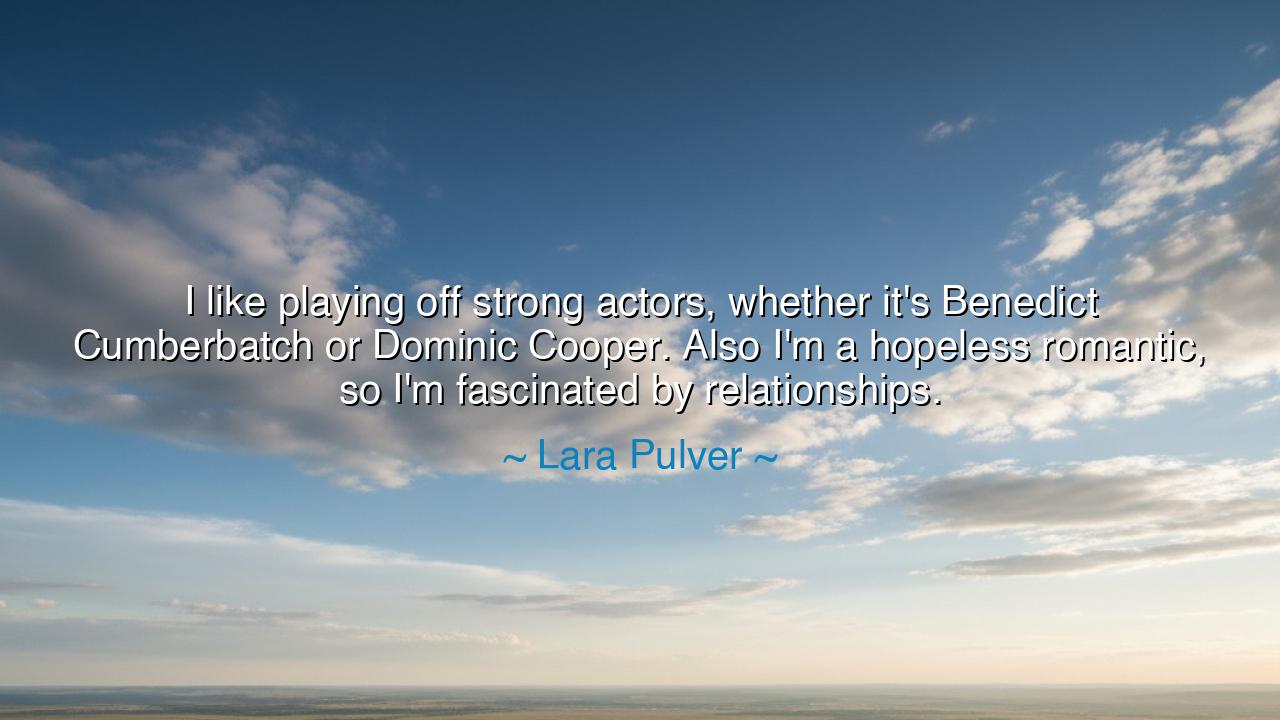
I like playing off strong actors, whether it's Benedict
I like playing off strong actors, whether it's Benedict Cumberbatch or Dominic Cooper. Also I'm a hopeless romantic, so I'm fascinated by relationships.






In the words of Lara Pulver, "I like playing off strong actors, whether it's Benedict Cumberbatch or Dominic Cooper. Also I'm a hopeless romantic, so I'm fascinated by relationships," we are invited into the heart of what it means to connect—not just as performers, but as human beings navigating the intricate dance of emotion, connection, and identity. Pulver, by sharing her appreciation for strong actors and her fascination with relationships, reveals a deep truth about the nature of both her craft and the human spirit. At its core, acting is an exploration of human connection, and relationships—whether they unfold on stage, screen, or in our own lives—are the canvas upon which the greatest dramas are written.
The ancients understood the power of relationships in their storytelling, for the most profound tales were those that revolved around human connection. Consider the Greek tragedies of Sophocles and Euripides, where the lives of great heroes and gods were often defined not by their actions alone, but by their relationships with others. Take Antigone, for example, a tragic figure whose sense of familial duty clashes with the law of the state. Her relationship with her brother, even in death, defines her character and fuels the drama of the play. In a similar vein, Pulver’s fascination with relationships speaks to a universal truth: that the bonds we share—whether of love, loyalty, or conflict—shape the very essence of who we are. Her connection with strong actors—those who can deeply engage in this emotional complexity—reflects the depth that relationships bring to human existence.
Furthermore, relationships are not merely the backdrop for drama, they are the driving force behind much of human experience. The Romans, too, understood this power. In Plutarch’s lives of great men, the relationships between leaders and their loved ones, friends, and rivals were just as important as their military or political achievements. Caesar and Brutus, for instance, were bound not just by their roles in the Republic but by a complicated and ultimately tragic relationship of trust, betrayal, and honor. Pulver’s emphasis on relationships mirrors this ancient wisdom—relationships are not just part of the story, they are the story itself, and it is through them that meaning is often made manifest.
The mention of strong actors, such as Benedict Cumberbatch and Dominic Cooper, also hints at the alchemical nature of human connection. In acting, the interplay between performers brings something greater than what either could achieve alone. Cumberbatch, with his nuanced performances, and Cooper, with his emotional range, bring strength and vulnerability to their roles, making their relationships on-screen more real, more impactful. This mirrors the ancient view that true strength in relationships comes not from the individual, but from the synergy that emerges when two beings, each with their own complexities, interact deeply with one another. The ancients believed that the most profound heroic acts were those born from the support and conflict that arose in human relationships.
Pulver’s self-identification as a hopeless romantic further reveals the depth of the emotional engagement that she seeks. To be a romantic is to believe in the transformative power of love, of connection, and of the potential for growth through relationships. This sentiment is echoed in the ancient myths—whether the love between Orpheus and Eurydice, or the tragic, unconsummated love of Achilles and Patroclus, where the depth of emotion transcends the boundaries of mere romantic affection and enters the realm of self-sacrifice and personal transformation. The romantic's journey is one not of idealizing love, but of deeply feeling its power, both to uplift and to destroy.
The lesson embedded in Pulver’s reflection is one of empathy and connection—the understanding that our relationships shape the very fabric of who we are. Just as great actors draw from one another to create something transcendent, so too do we, as human beings, grow and transform in our interactions with others. The greatness of relationships lies in their ability to reveal the deepest parts of ourselves—our vulnerabilities, our passions, our flaws. To truly live is to be open to these relationships, to embrace them with both courage and humility, knowing that they will challenge us and change us in profound ways.
In your own life, seek out the strength of relationships. Just as Pulver appreciates the connection she shares with strong actors, so should you recognize the importance of deeply engaging with those around you—whether in love, friendship, or professional partnership. Allow yourself to be vulnerable and authentic, for it is in these moments of connection that true growth occurs. Remember, as the ancients knew, human relationships are not merely the backdrop of life—they are the very essence of it, shaping who we are, what we value, and how we navigate the world. In this pursuit, you will find not just love, but purpose and meaning in the connections you create.






AAdministratorAdministrator
Welcome, honored guests. Please leave a comment, we will respond soon